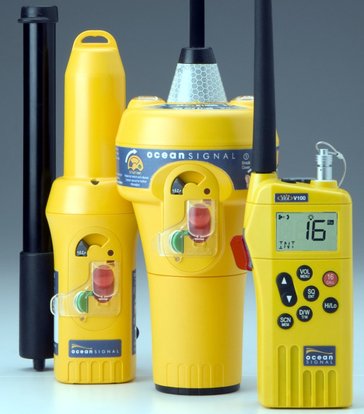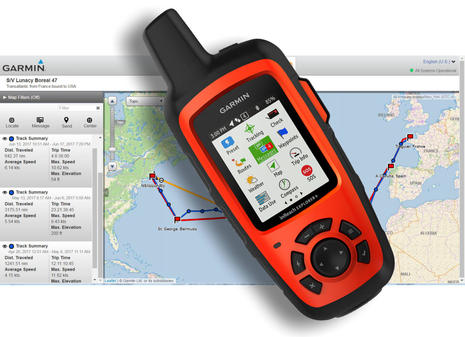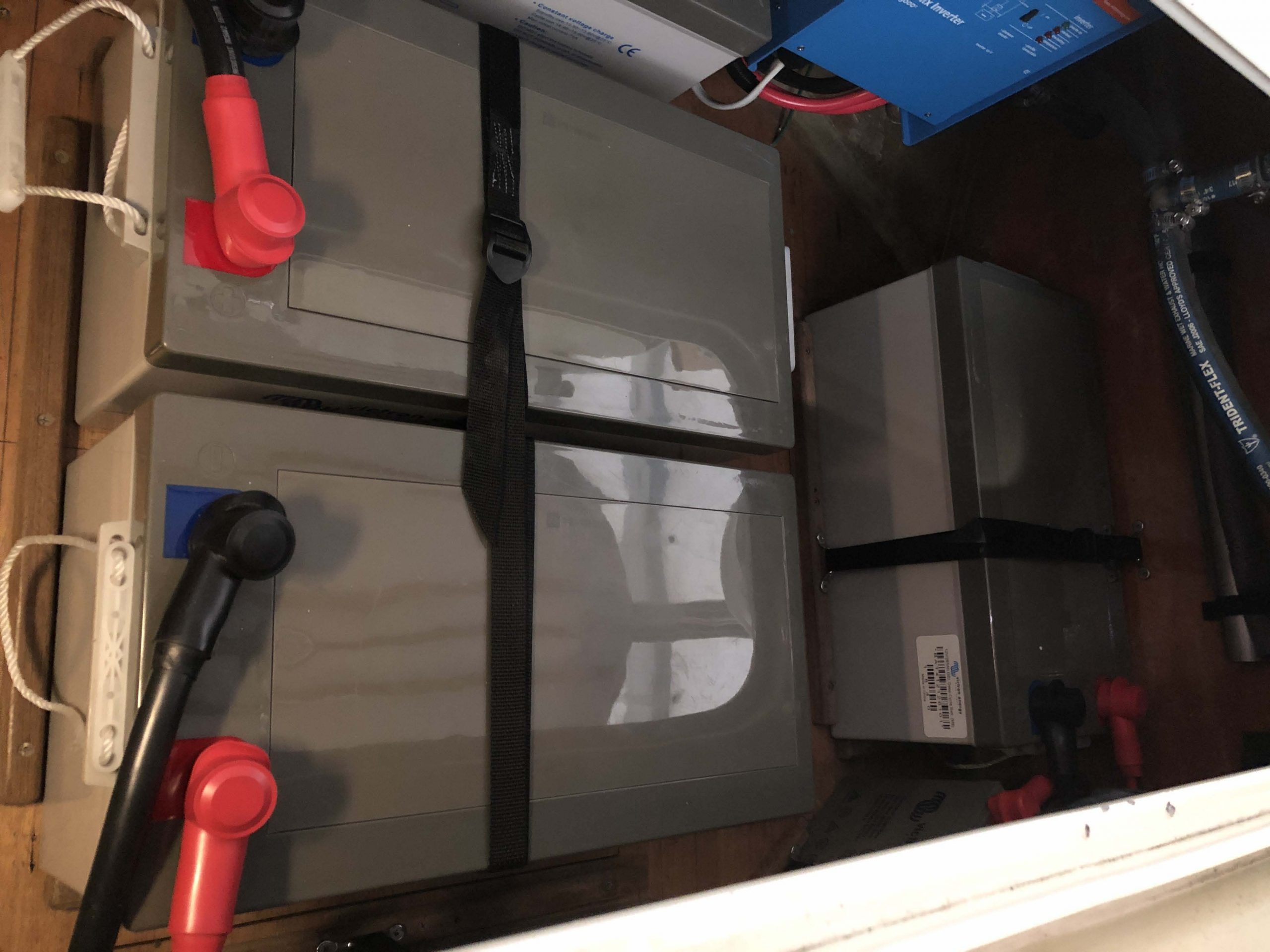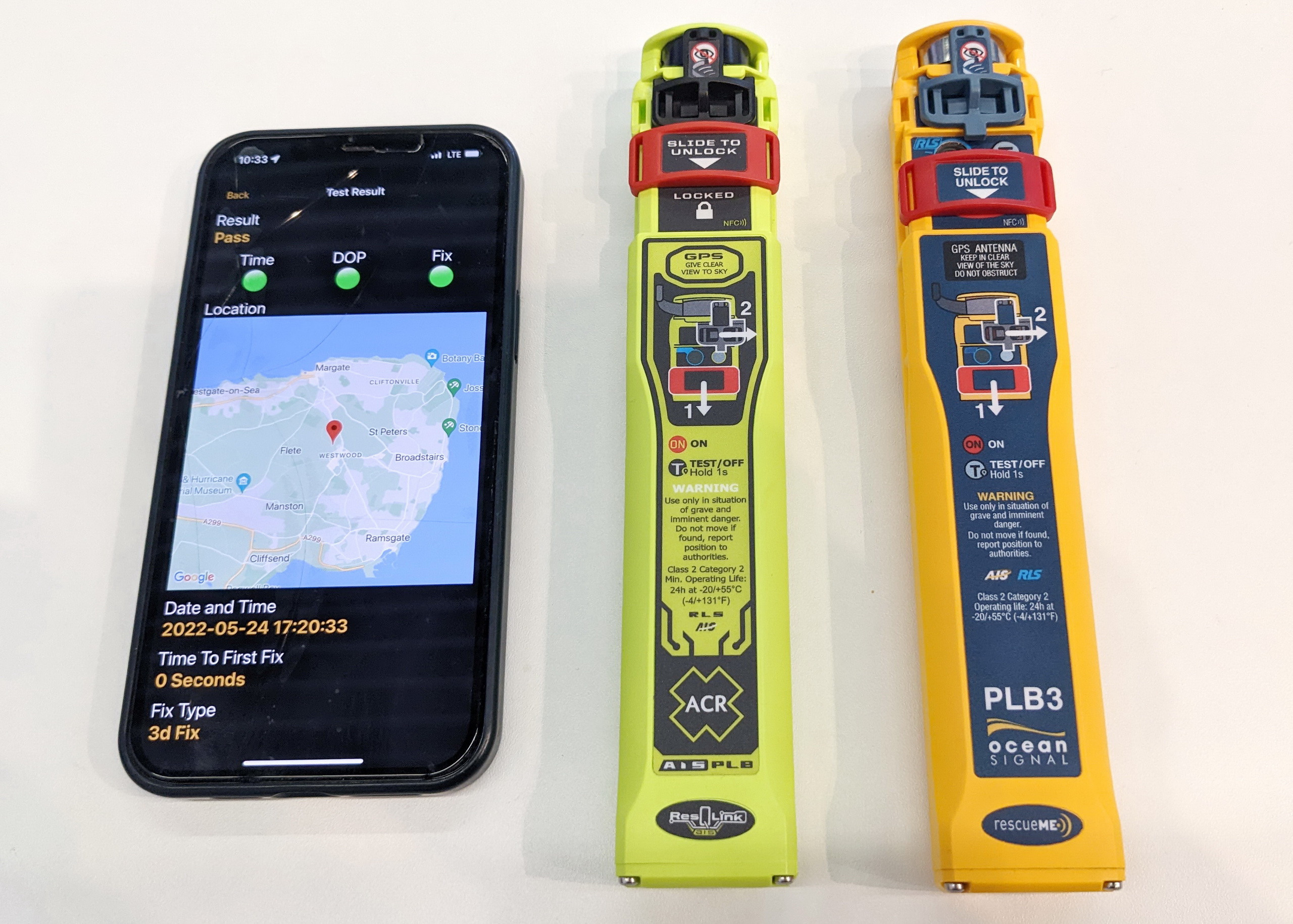Welcome Ocean Signal, but is COSPAS-SARSAT “endangered”?
Ocean Signal is a relatively new name in serious marine safety gear, and Ocean Signal America — run by the same team that distributes Digital Yacht and recently-mentioned Digital Deep Sea in the States — just debuted at the last Miami Boat Show. That’s where I got to see and handle the gear above, and the company’s claimed engineering expertise seemed borne out. The Ocean Signal equipment struck me as beautifully designed, and there are some features, like user-replaceable EPIRB batteries, that will appeal to yachties. But the company may be smart to focus on commercial marine, as I’m beginning to wonder if COSPAS-SARSAT equipment has much future with boaters who can choose other solutions…
It used to be easy, and very true, to say that a device like the original SPOT did not have nearly the reliability of the EPIRBs and PLBs which are built to the COSPAS-SARSAT standards and use its non-commercial satellite system…though SPOT was great for non-emergency use. Now it’s becoming clear that not only has SPOT’s technology improved, but there are about to be a bunch of Iridium-based SENDs like the DeLorme inReach discussed recently that will offer truly global two-way emergency messaging. (SEND, by the way, stands for Satellite Emergency Notification Device, and is an acronym worth knowing.)
But perhaps more important, over a last couple of years most of the SEND companies and the various SAR authorities have begun working together to create standards and processes to ensure that commercially originated distress signals get treated as efficiently as those coming from EPIRBs and PLBs. In fact, two-way SENDs could make rescues more efficient, and could reduce false alarms. Naturally I’ve been following all this with interest, but it took a Doug Ritter blog post — “SEND Standard Approved by RTCM – Is COSPAS-SARSAT On Endangered List?” — to contemplate where all this may be headed. Doug has been focused on safety beacons at least since 2004 when he and his Equipped to Survive Foundation uncovered some serious performance issues. In that blog entry he details the current industry and regulatory situation, some of which he’s been actively involved in, and concludes that the established COSPAS-SARSAT system is in real danger of becoming irrelevant, adding that:
If that happens, then those {COSPAS-SARSAT} bureaucrats are going to find themselves short on work, because if only those required by regulation to carry a 406 MHz beacon are buying, then the market is going to shrink significantly and innovation in 406 MHz beacons will dry up and some manufacturers may likely abandon it. Those who must buy a regulated product almost always go for low price, not performance or features.
Yike! Doug doesn’t mince his words — and of course this sort of major change isn’t going to happen tomorrow — but do you think his concerns are valid? If you already own an EPIRB or PLB, do you think it’s your last?















Ben, this is a truly important issue. First, in response to your question: My current EPIRB is over a decade old and doesn’t have built-in GPS, but I intend to replace it within a year or two with one that does. On the other hand, I’m willing to consider other devices. But for those other devices to seriously catch my attention, they must give me *at least as great* probability of being rescued in a timely manner if I should find myself in need. Bells and whistles are nice, but not as important as the basic functionalities. One thing that concerns me is the government-vs-commercial implications. While I can agree that government oversteps its bounds too often, I feel safer knowing that government-funded and -maintained satellites, agencies, etc. are watching for my emergency beacon signal, as opposed to a corporation that might go bankrupt while I’m at sea, never mind one that hires a new president who thinks I should start paying for the service…again, while I’m at sea!
I share your concerns, Jim, but the times “they are a-changin.” The fact is that the U.S. government, and others, are now using commercial satellite systems for duties arguably more critical than a civilian SAR system. I too am a bit uncomfortable with it, but I can also see how a specialized company putting up birds with multiple functions might be a lot more efficient use of resources.
Coming SENDs are a bit speculative, but two-way communications is more than “bells and whistles.” I can picture a time when one-way, no-way-to-cancel EPIRBs and PLBs seem pretty crude.
Ben, with the systems available today, what would be the the most reliable emergency locator for a boat that navigates no more than 50 miles offshore?
Jeff, I don’t think anyone would argue that EPIRBs and PLBs are the most reliable emergency locators today, even on land. But DSC VHF radios, if properly hooked up to GPS, can also deliver a distress message with your precise location directly to the US Coast Guard. Range is partially dependent on your radio set-up, but the new Rescue 21 high towers are pretty effective, I believe. More info here:
http://www.uscg.mil/acquisition/rescue21/default.asp
I consider SPOT devices dubious as a primary emergency beacon offshore, but they are getting more reliable and they do non-emergency things that are great. But the new Iridium-based messenger/beacons may turn out to be as reliable as EPIRBs/PLBs, and maybe better in an emergency because you can use them to communicate with the SAR people. But they aren’t even on the market yet, at least the consumer-priced ones, so this is all conjecture.
Hi Ben,
We hire out the Spot trackers to customers who use them for safety while tramping and boating,
The idea that family members can check on where they are on a webpage really makes remote trips more comforting for them.
But, and this is a big but, we find almost all of our customers, even after a good briefing, and written instructions, forget to reset the Spot unit every 24 hours or sooner. additionally, some also think of saving the batteries by turning the unit off overnight, then forgetting to turn it on the next day.
This means, we get a call or note ourselves, that there has been no update from the tramper or boatie, and if storms or snow are nearby, and the tramper is not at a hut, and nothing heard from them, we fear the worst.
What is needed, is for Spot to change to a turn on leave on, no reset needed, system.
I have asked them, but apparently the license agreement with Axonn, the makers of the unit, won’t allow the set up of a no need to reset unit.
For us, this means we may move to a system called Yellow Brick if we can see if the sat fees are reasonable for our usage.
The Yellow Brick system allows the owner to turn on the tracker remotely, so that means we can turn it on if the hirer forgets and it means we can extend the battery life by remotely changing the reporting frequency from say every 10 minutes to say once a day for extended hires so the battery lasts longer.
We really like the Spot 2, the Spot One was a bit harder to use but had longer AA battery life, the new Spot 2 uses aaa batteries so less battery life but the buttons are clearer to use.
We may modify the unit once the warranty is finished to allow for more batteries and a timer to reset the unit automatically.
Once the Delorme and the spot communicator are packaged together that will be so cool and we may buy one then.
For hire use, it really needs to be so easy to use.
Kind Regards,
Michael.